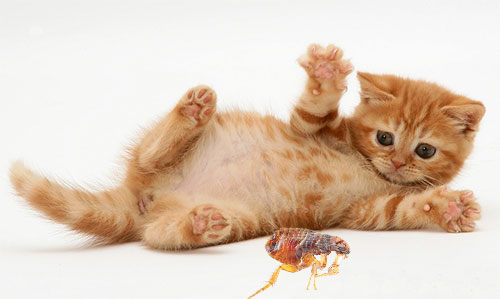
Soft and fluffy, kittens, of course, can sometimes scratch and even bite, but in general, they are cute and positive creatures. Fleas in kittens usually appear immediately after their birth, jumping on them from the fur of the mother cat. But even if the cat is not infected with fleas, at a certain age, kittens begin to go outside and communicate with other animals, almost certainly receiving a portion of parasites. This is where the owners of the pet face the seemingly simple task of how to get rid of fleas in a kitten, which, however, turns out to be not so simple.
It is important to understand that flea treatment for kittens is required in any case when they are infected. Fleas cause severe itching in the animal, sometimes allergies and dermatitis, and in case of serious infection, they lead to exhaustion of the baby and the development of blood diseases in him.
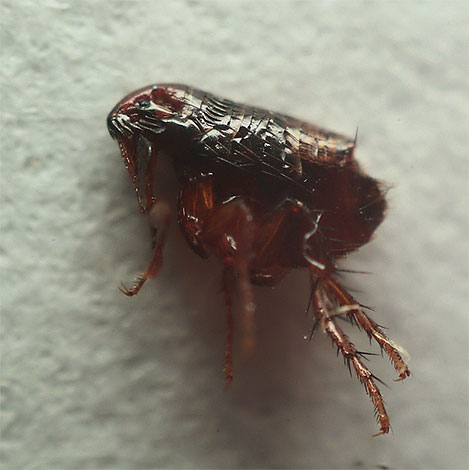
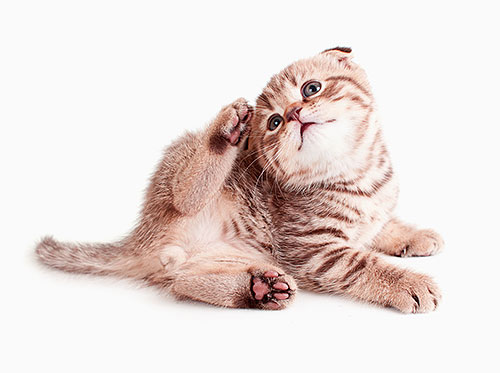
In addition, fleas carry deadly diseases for both cats and humans, and are also intermediate hosts for many types of worms. Often, kittens heavily infested with fleas simply die, unable to withstand such a parasitic load on a still fragile body.
On a note
Fleas in a kitten do not necessarily belong specifically to the type of cat fleas: rat, dog, human, rabbit and some other types of fleas can also parasitize on small pets. Moreover, all these types of parasites are almost the same for a non-specialist, and the symptoms of fleas in a kitten do not differ from species to species. The method of ridding a kitten of fleas does not depend on the species of parasites.
The most dangerous fleas in newborn kittens - in large quantities they can lead to death of babies. Newborn kittens can be rid of fleas only by physical methods - combing and bathing, which, as practice shows, not every owner will do (the use of chemicals at this age should be avoided in every possible way, since their use is fraught with poisoning of kittens and dangerous allergic reactions). However, there is good news: there are special methods for removing parasites for newly born kittens, which we will discuss in more detail below.
In the photo below - fleas in a kitten in wool:
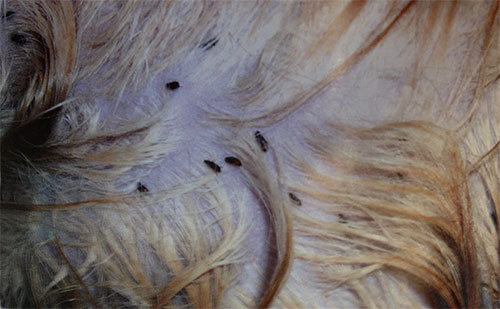
To rid kittens of fleas today, a large number of effective products are produced and sold, all of them have their own specifics and require a careful and deliberate approach to use. Immediately you need to be prepared for the fact that treating kittens for fleas requires a little more effort than in the case of adult animals - because of the need to comply with increased security measures.
Flea symptoms in kittens
Finding out if a kitten has fleas is quite simple: with their bites, they cause constant itching in the animal, and the baby often itches behind the ears with its paws, trying to bite insects out of the wool. From especially strong bites, the kitten can twitch and wake up, sharply break away from food and play.
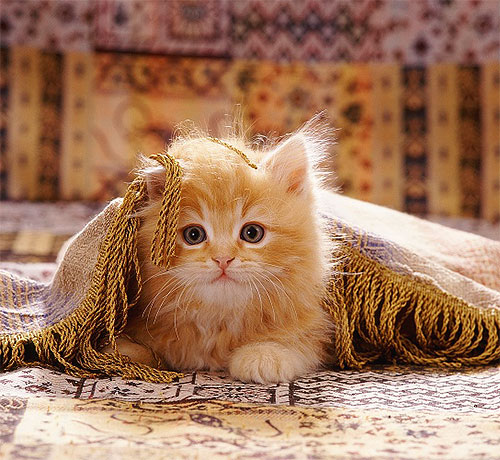
Other symptoms of fleas in kittens are visible red dots and bite marks on the skin under the coat., and sometimes - dermatitis and an allergic reaction to multiple bites. A severely infected kitten looks sickly and emaciated, and bald spots appear on its coat from constant scratching.
The photo below shows close-up fleas - the culprits of the kitten's torment:
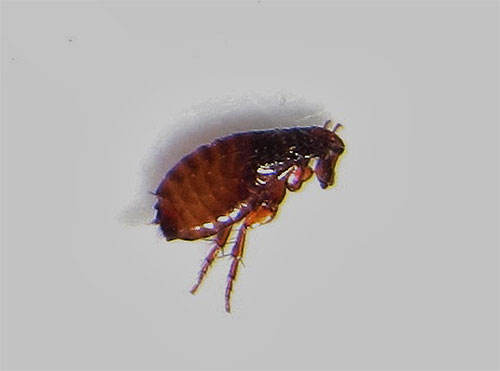
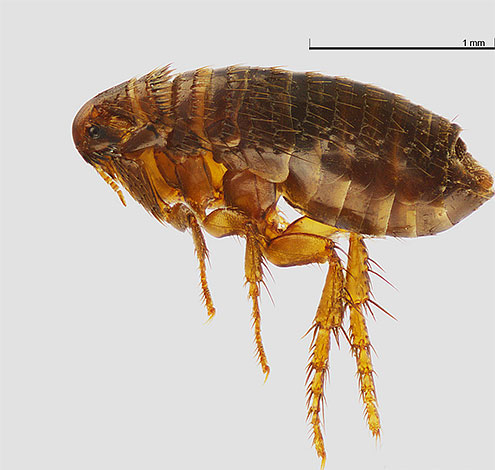
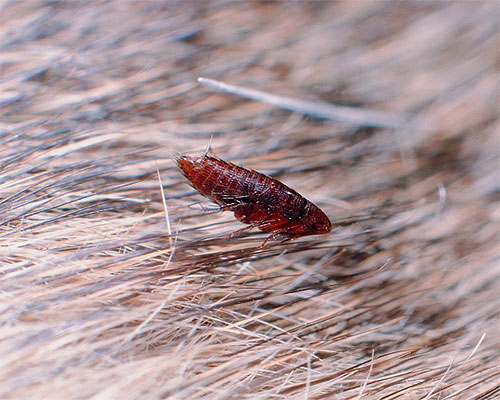
On a note
If the kitten itches, but he does not have fleas, just as the mother cat does not have them, you should show the baby to the veterinarian - subcutaneous mites or dermatological diseases can be the cause of itching. These diseases should be treated in completely different ways.
An indirect sign of the presence of fleas in a kitten are helminths. This is especially true for kittens who have not yet begun to eat meat and fish. For example, in a monthly kitten, fleas and worms usually appear simultaneously - at first, fleas begin to feed on the animal, and after a week or two, the baby becomes infected with worms from them.
But perhaps the easiest way to detect fleas is simply by carefully examining the animal's coat. Fleas in a kitten of 1-2 months of age are especially noticeable: the hair of such babies is short and the parasites cannot even hide in it. Usually, fleas in a kitten's fur can be seen with the naked eye.
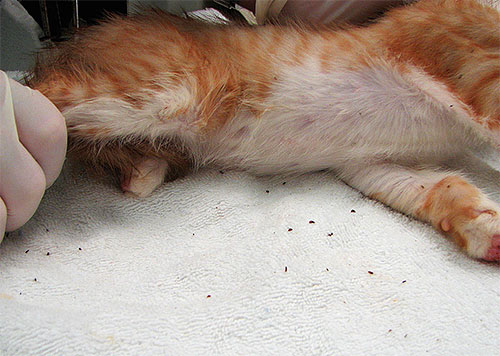
An important point: when you find fleas in a small kitten, you can’t immediately rush for the first remedy that comes across and treat the crumbs with it. The specificity of removing fleas from kittens lies in the strict observance of strict security measures.
Safety rules: when drugs are more dangerous than the fleas themselves
In order to get rid of fleas in a kitten, you should first of all have a good idea of what makes this or that medicine for parasitic insects effective. In most flea preparations, the active ingredient is insecticides, although relatively non-toxic to adult animals, they can cause severe side effects in kittens.
So, for example, some organophosphorus insecticides (Malathion, Dichlorvos), as well as pyrethroids (Permethrin and its derivatives, Cypermethrin, Deltamethrin, Alfametrin) are dangerous for kittens. If flea medicine for kittens contains these ingredients, it should not be used on pups under 6 months of age.
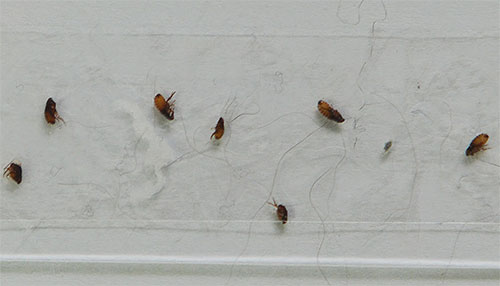
It should also be remembered that it is possible to treat kittens for fleas only after weaning them from their mother: all flea remedies remain on the baby’s fur for some time, and if the mother cat licks him, part of the drug will definitely get into her milk. In the nursing cat itself, it is also impossible to poison fleas with chemicals.
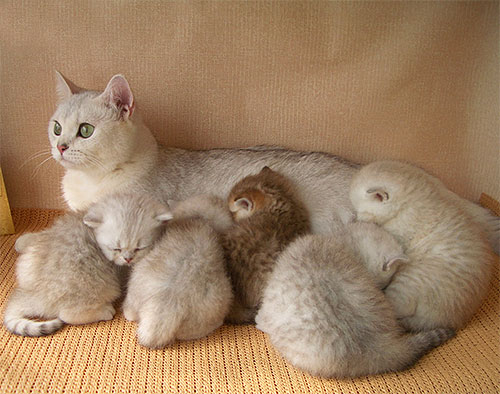
In any case, it is impossible to get rid of fleas with insecticidal preparations if the kitten is less than 1 month old. If the kitten has a lot of fleas - so many that they can be a threat to his life - for several days, while the fight against parasites will be carried out, he should be weaned from his mother and allowed only during feeding.
If even monthly kittens have fleas, but not in very large numbers, it makes sense to take preventive measures, and before completely getting rid of parasites, wait until the kitten grows at least a little.
Kittens of different breeds and ages: what medicines are suitable for them?
Depending on the age and breed, getting rid of fleas in a kitten should be the best means for him.
Consider the main ones:
- Flea treatment of kittens under the age of 1 month is carried out only mechanically - Parasites are combed out of the baby's coat with a thick and soft comb. Usually a kitten of this age does not have too many fleas, and such mechanical treatment gives a good result.
- In addition, fleas in a kitten over 1 month old can be treated with Mr. Kiss.
- You can eradicate fleas from a kitten older than one and a half months with special drops from Stronghold fleas. This drug is safe (it is believed that a cat can drink several Stronghold pipettes without harm to itself). However, during the treatment procedure, the drug may cause increased salivation due to the alcohol it contains.

- You can fight fleas in kittens older than 2 months with Beaphar powder and spray, Phytoelita shampoo, Hartz drops for kittens.
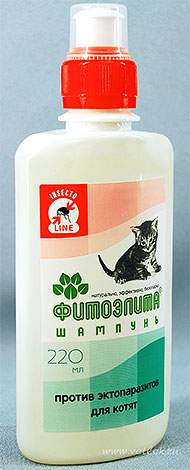
Finally, from the age of three months, you can rid a kitten of fleas with Advantix drops, Bars for kittens, Hartz and Blochnet specialized preparations.
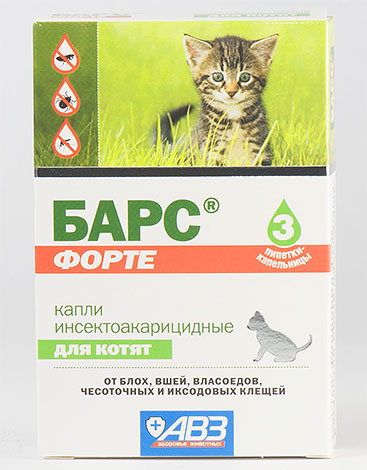
British kitten, Bobtail, Persian, Himalayan kitten get rid of fleas usually with the help of shampoos. Kittens with short hair are easier to treat for fleas with drops or sprays.
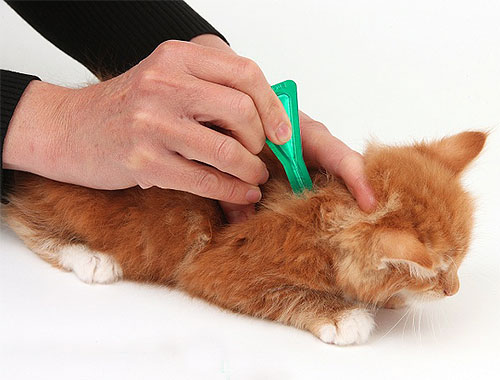
Review
“We got a British kitten at the persuasion of the wife. They took in the nursery, with a pedigree, healthy. A month later, the kitten found a lot of fleas. From where - we can’t imagine, but it’s clear that they are disturbing him. My wife bought some kind of powder, but she couldn’t even start processing it - it needs to be rubbed into the skin, and with such wool as Bob’s, this is impossible. It all ended with Phytoelite shampoo - half an hour of heart-rending screams under the tap, fleas in the bathroom and that's it, not a single parasite.
Gennady, Tver
On an individual basis, a kitten may develop an allergy or side effects from a particular remedy.In this case, the use of the drug should be discontinued and a remedy with a different active substance should be purchased. With a strong reaction to the drug, the kitten should be shown to the veterinarian.
On a note
It is believed that the safest way to rid kittens of fleas is with the help of special insecticidal powders. However, their use in kittens of long-haired breeds is quite problematic.
Flea Removal Sprays
Kitten spray should be treated after a good feeding. The baby should hold his head so that he does not accidentally put it under the jet of the drug, gently push the hair apart and spray the opening skin areas.
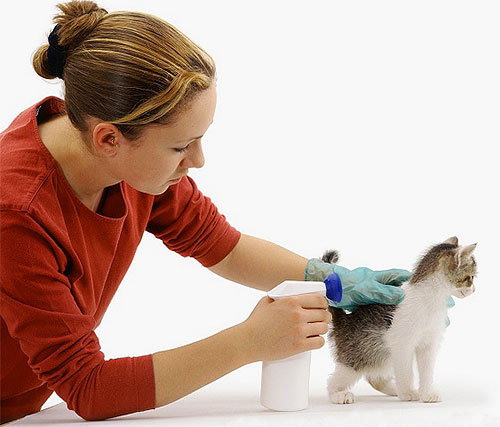
Care should be taken to ensure that the spray does not get into the eyes of the cub. After treatment with a kitten, you should play for half an hour or an hour, and then immediately buy it out.
One of the best flea sprays for kittens is Beaphar, a reasonably priced flea spray that provides reliable parasite control.
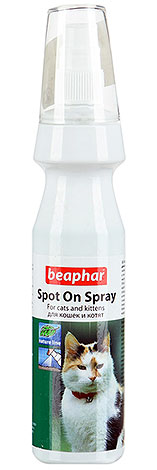
Hartz and Frontline sprays are also good, but only for kittens from the age indicated in the instructions for their use.
Review
“The easiest way to cure a kitten from fleas is with a spray. Such a spray costs a little more than drops, but gives an almost instant result - fleas either die on the kitten or jump off it. We sprayed our miracle with Hearts, there were no problems from it, the fleas disappeared immediately ... "
Irina, Moscow
Powders for kittens and the rules for their use
Flea powder for kittens is suitable in most cases. Usually, Hartz or Gamma powders are used to get rid of fleas from kittens.
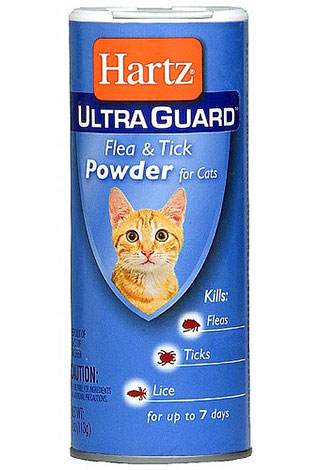
The latter can be applied to a kitten up to 1 month old, provided that within a few hours after treatment, he will not be in contact with his mother.
You can remove fleas from a kitten using insecticidal powder according to the following plan:
- Rub the powder into the kitten's fur or skin.
- Then shake off the powder that remains on the tops of the hairs.
- At the end of the procedure, comb out the kitten.

If the kitten continues to suckle its mother during this period, after processing it must be placed in a separate tray and bathed in an hour or two. After that, it can be put under the cat again.
How to wash a kitten from fleas?
It is best to wash a kitten from fleas with Phytoelita or Mr. shampoos. Kiss - they are as safe as possible and practically do not lead to side effects.
A kitten is bathed with flea shampoo in the same way as with ordinary water procedures.
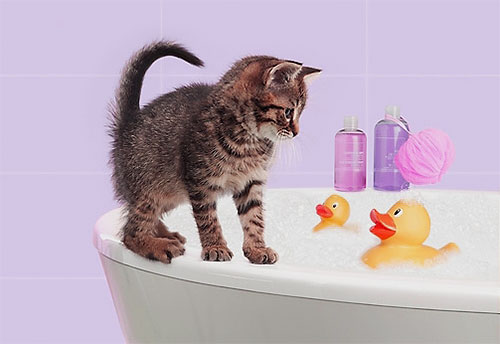
It is only important to thoroughly lather the product and make sure that all the kitten's hair is treated with it.
For several minutes, the foam is aged on the pet, and then washed off with plenty of running water.
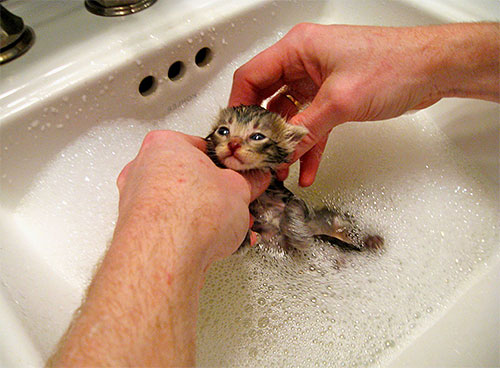
What to do if a kitten is poisoned by a flea remedy?
In rare cases, a kitten may accidentally swallow flea drops or lick shampoo or powder off their fur. This in most cases does not lead to serious consequences, but sometimes the baby develops allergies, vomiting, salivation, anxiety, shortness of breath, discharge from the nose and eyes, as well as other signs of intoxication. If it seems to you that the kitten has been poisoned by flea drops, it should be given plenty of water or milk and taken to the veterinarian as soon as possible. Previously, the drops themselves from the skin of a kitten can be wiped off with a cotton swab with vegetable oil.
And finally, if the kitten's fleas were successfully removed, it remains to fix the result. The first is to buy anthelmintic drugs and pickle worms from the baby.The second is to look for fleas in the apartment, and if they are found, remove them in any way, up to treating the entire room from fleas. In the future, the kitten should buy a special "children's" flea collar and let it go outside only in it.
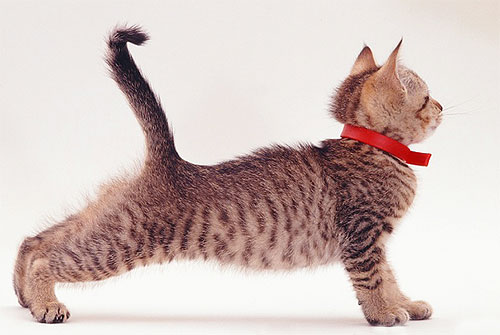
So the baby will certainly be protected from fleas in the future.
An interesting video comparing the effectiveness of different types of flea products

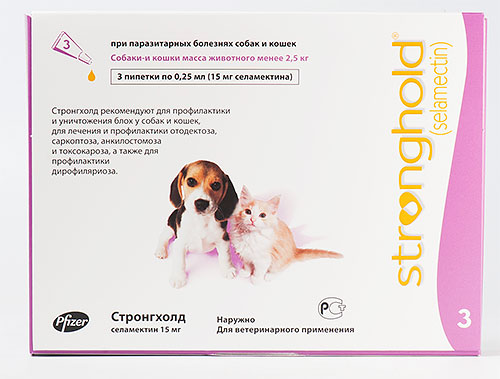
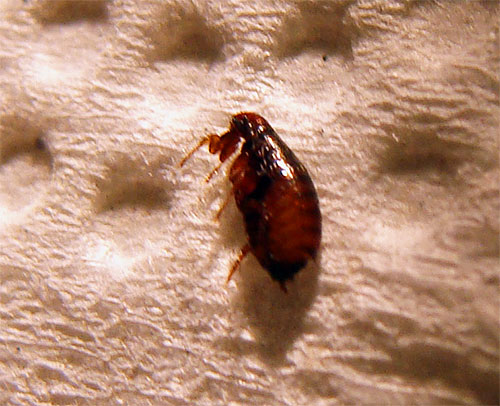
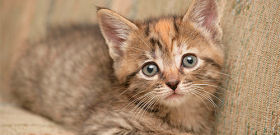
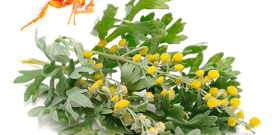
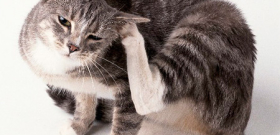
Thanks
Thank you very much, it helped a lot, now the kitten is without fleas.
And what tool did you use? I did not understand well.
Talk to your veterinarian about flea remedies. Your veterinarian can help you find a safe and effective remedy. It's also a good idea to purchase a veterinarian-prescribed product directly from a veterinarian's clinic, as some pet store flea products can be dangerous to cats.You can use topical drops and even oral preparations against fleas.
I have such a problem: the kittens are only 15 days old, but fleas are already running over them. What do you advise me to do? How to get them out without harming either the kitten or the mother?
Hello! I have a kitten, he is a month old in three days. He's dehydrated and the doctor said to get the fleas and worms out. But how to do it, did not answer. Isn't it too early for him and nothing that he is dehydrated?
Just put wormwood.
My kitten is two months old and has fleas running all over him. It has already been mentioned here that there are many different products that you can buy in pharmacies, but I am afraid that this may affect the health of my lump. Are there any other methods?
Tar soap kills fleas better than any means and is non-toxic! Soap the kitten and hold for 5 minutes, fleas die out instantly.
Wormwood does not help, I already tried.